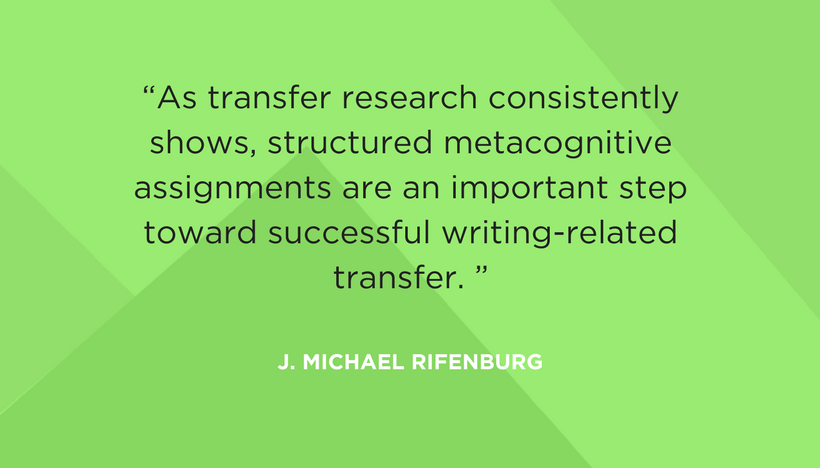This post was written by NCTE member J. Michael Rifenburg.
I recently returned from Kansas City, where the Annual Convention of the Conference on College Composition and Communication offered close to thirty panels focused on writing transfer. In the wake of Kathleen Blake Yancey, Liane Robertson, and Kara Taczak’s award-winning Writing across Contexts: Transfer, Composition, and Sites of Writing, Elon University’s research seminar on transfer, and scores of articles in NCTE publications, college writing instructors are thinking hard about ways to study and teach for transfer.
In a landscape increasingly skeptical of higher education, transfer research is an important tool we have for clearly communicating to all our external stakeholders the work we accomplish with student writers each semester.
As transfer research consistently shows, structured metacognitive assignments are an important step toward successful writing-related transfer.
I have spent my professional career working with student-athlete writers and have a particularly receptive audience for metacognitive assignments among this unique student population.
Last year, I taught a class where twenty-five of the twenty-six students were student-athletes. I wrote a blog post for NCTE about this class when I was in the middle of teaching it.
During the semester, I tried to hone student-athletes’ metacognitive strategy knowledge (MSK). Educational psychologist Yves Karlen of the University of Zurich, in the Journal of Writing Research, understands MSK as “verbalizable knowledge about disadvantages and advantages of specific strategies regarding task characteristics.” Karlen writes that MSK is composed of conditional knowledge and relational knowledge. Conditional knowledge gauges how well a learner understands when to use specific skills. Relational knowledge gauges how well a learner understands how skills used in one writing context are related to writing skills used in a different writing context.
I offered two assignments that invited student-athletes to work on MSK. For the first assignment, taken from the writing textbook Writing about Writing, students picked a previous paper they authored and considered how that rhetorical situation shaped their piece of writing. The second assignment asked student-athletes to draw similarities between writing for a nonschool group (like a sports team or sorority) and a school group (like a history or sociology class).
The rhetorical analysis paper asked students to flex their conditional strategy knowledge muscles; the discourse community paper asked students to flex their relational strategy knowledge muscles.
The student-athletes’ work still sticks with me. One student-athlete, a catcher on the baseball team, authored a strong paper comparing the literacy practices of academic writing with those of baseball. In his paper, Bill LeRoy, a math education major, introduces readers to baseball scouting reports and spray charts, which visualize the location of all a batter’s hits. Readers learn of the thoughts swirling through his head when batting: how many outs are there, where has the pitcher already thrown the ball? He thinks hard about the role of rhetorical terms like audience and purpose in baseball.
Metacognition is a large, amorphous term. When we weave metacognitive assignments into our curriculum, what exactly are we asking for? Conditional knowledge? Relational knowledge? Both? Instead of offering just a broad assignment about reflection, MSK helps us make sense of metacognition in structured ways.
At the end of the semester, I received permission to interview some of the student-athletes about this class. I talked with Bill in my office one September day. I remember reaching to turn off my recorder when we were done talking. But he spoke again: “And after writing some of the papers, I realized, you know, the scouting report, a lot of the things did relate to baseball. We need writing, we need communication, a lot of that is key and relates to baseball.”
Relational strategy knowledge, indeed.

Michael Rifenburg is an assistant professor of rhetoric and composition at the University of North Georgia. For the past decade, he has worked with and written about student-athlete literacy at two different Division I schools and one Division II school. His work culminated in the forthcoming book, The Embodied Playbook: Writing Practices of Student-Athletes, due out from Utah State University Press in May.

